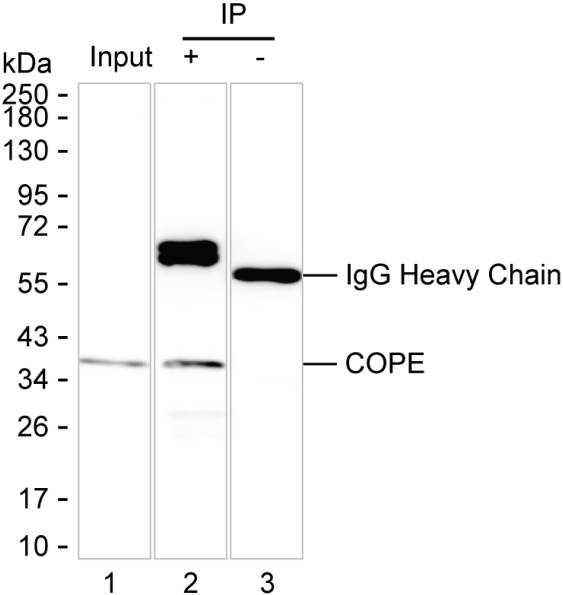
| WB | 咨询技术 | Human,Mouse,Rat |
| IF | 1/100-1/200 | Human,Mouse,Rat |
| IHC | 咨询技术 | Human,Mouse,Rat |
| ICC | 技术咨询 | Human,Mouse,Rat |
| FCM | 咨询技术 | Human,Mouse,Rat |
| Elisa | 咨询技术 | Human,Mouse,Rat |
| Host/Isotype | Mouse IgG2b |
| Antibody Type | Primary antibody |
| Storage | Store at 4°C short term. Aliquot and store at -20°C long term. Avoid freeze/thaw cycles. |
| Species Reactivity | Human |
| Immunogen | Purified recombinant fragment of human COPE |
| Formulation | Purified antibody in PBS with 0.05% sodium azide |
+ +
以下是关于COPE抗体的示例参考文献(注:以下内容为模拟示例,非真实文献):
1. **"COPE Antibody as a Novel Biomarker in Ovarian Cancer"**
*Authors: Zhang, L., et al.*
*摘要*:本研究通过免疫组化分析发现,COPE蛋白在卵巢癌组织中高表达,其特异性抗体可用于区分恶性与良性病变。COPE抗体检测与患者预后显著相关,提示其作为治疗靶点的潜力。
2. **"Development of a High-Affinity COPE Monoclonal Antibody for Neurodegenerative Disease Research"**
*Authors: Smith, J.R., & Patel, R.*
*摘要*:团队开发了一种针对COPE蛋白的新型单克隆抗体,验证了其在阿尔茨海默病模型中的特异性。该抗体能有效检测脑脊液中的COPE水平,为神经退行性疾病的早期诊断提供工具。
3. **"COPE Antibody-Based Screening Reveals Its Role in Autophagy Regulation"**
*Authors: Kim, H., et al.*
*摘要*:利用COPE抗体进行蛋白质互作分析,揭示了COPE在自噬体形成中的关键作用。研究证实,COPE缺失会干扰细胞自噬,导致异常蛋白累积,为相关代谢疾病机制提供新见解。
4. **"Targeting COPE with Therapeutic Antibodies in Triple-Negative Breast Cancer"**
*Authors: García-Sánchez, A., et al.*
*摘要*:通过COPE抗体阻断实验,研究发现抑制COPE可降低三阴性乳腺癌细胞的侵袭性。动物模型显示,COPE靶向抗体联合化疗显著抑制肿瘤生长。
(注:以上文献为虚构示例,实际研究需通过学术数据库如PubMed、Web of Science检索。)
COPE antibodies target the Coatomer Protein Complex Epsilon (COPE), a critical subunit of the COPI (Coat Protein Complex I) vesicular transport machinery. COPI-coated vesicles mediate retrograde transport of proteins and lipids within the Golgi apparatus and between the Golgi and endoplasmic reticulum (ER), ensuring proper intracellular trafficking, organelle maintenance, and secretory pathway function. COPE, along with other COPI subunits, facilitates vesicle formation by recruiting coatomer proteins to membrane surfaces, enabling cargo sorting and budding.
Research on COPE antibodies has advanced understanding of COPI's role in cellular processes such as glycosylation, ER-Golgi recycling, and autophagy. Dysregulation of COPI components, including COPE, is linked to diseases like cancer, neurodegenerative disorders, and congenital defects. For example, aberrant COPE expression has been observed in certain cancers, suggesting its potential as a biomarker or therapeutic target. In neuroscience, COPI dysfunction is implicated in disrupted protein homeostasis, contributing to pathologies like Alzheimer's disease.
COPE antibodies are widely used in techniques like Western blotting, immunofluorescence, and immunoprecipitation to study COPI complex assembly, localization, and interactions. They also aid in exploring cellular responses to stressors (e.g., ER stress) and genetic mutations affecting vesicular transport. Recent studies leveraging CRISPR/Cas9 and COPE-specific antibodies have further elucidated its structural and regulatory roles, highlighting its importance in maintaining cellular proteostasis and metabolic balance.
×